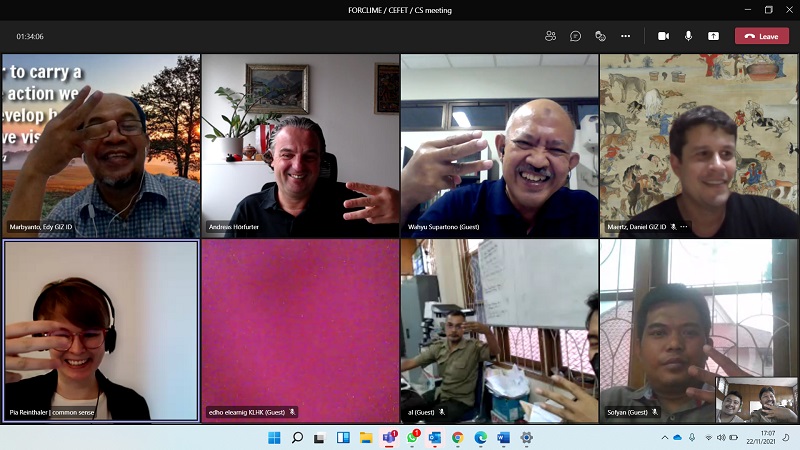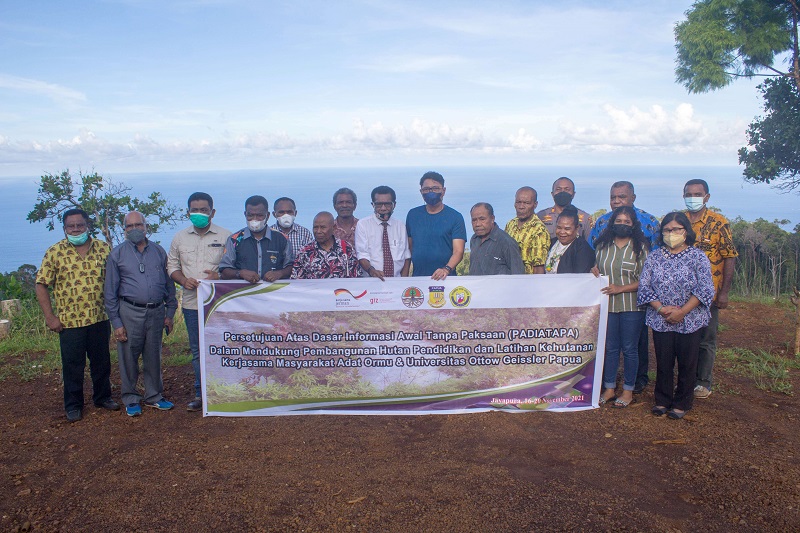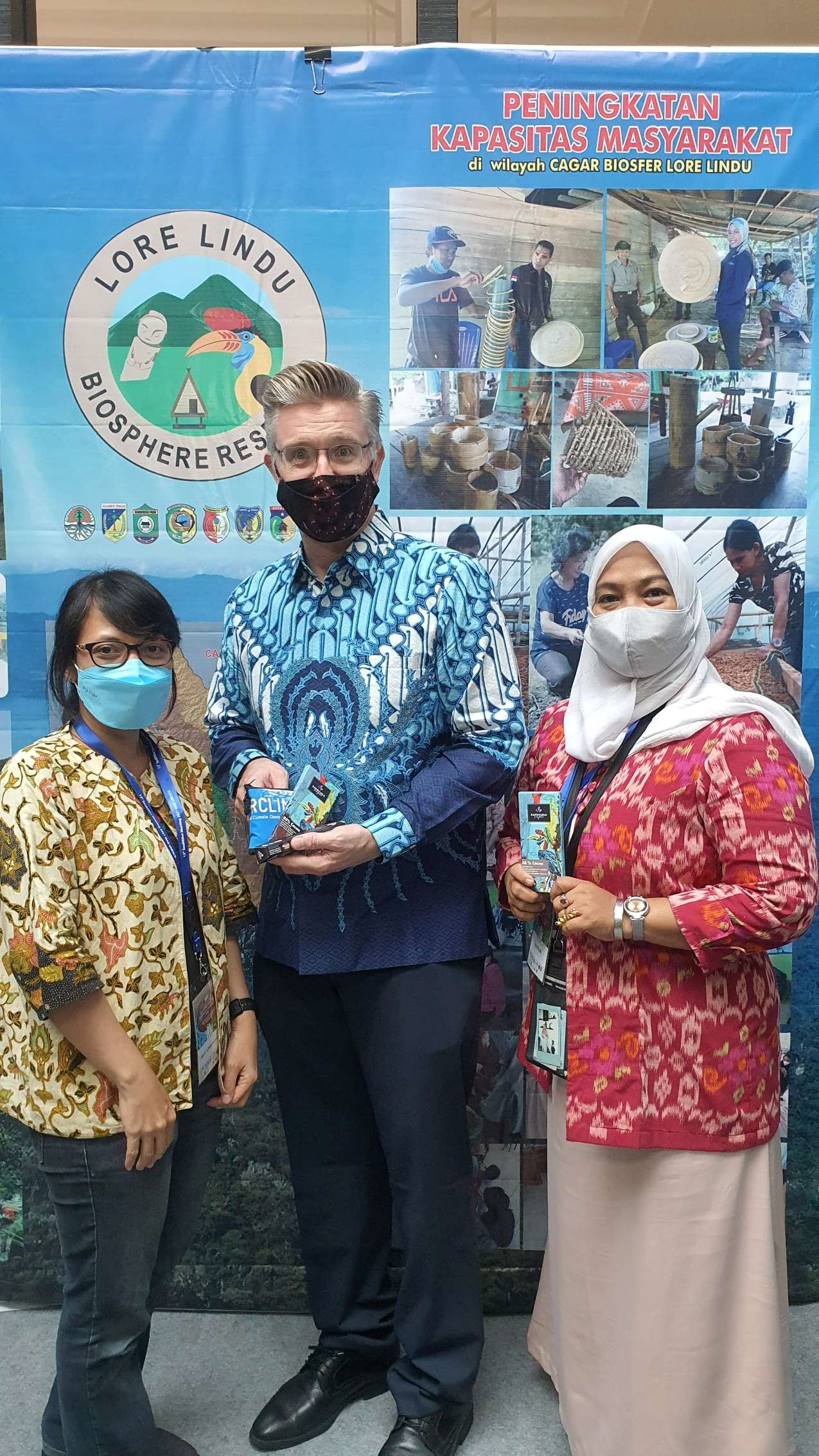FORCLIME
Forests and Climate Change ProgrammeTechnical Cooperation (TC Module)

Select your language

In 2014 the Forestry Education and Training Center entered the world of E-Learning. As a result, the monitoring and evaluation of the implementation of these E-learning activities has become necessary. The implementation of this Monev is supported by GIZ through CommonSense, an experienced consultant in this field. As a part of efforts in line with the preparation of the Monev on the implementation of E-Learning activities, the Environmental and Forestry Education and Training Center (Pusdiklat LHK), in conjunction with FORCLIME and CommonSense, held a first online meeting on Monday – Tuesday, 22 – 23 November 2021. This meeting was the first to be held since CommonSense provided assistance in relation to similar activities during the 2014 - 2016 period. CommonSense is expected to be able to provide E-learning development assistance services at the LHK Education and Training Center during the 2021 - 2023 period.
During this time, CommonSense will support the development of e-Learning through the capacity building of the E-learning Team and Widyaiswara, the development of the Learning Management System (LMS) and the development of LMS learning policies and guidelines.
For further information, please contact:
Edy Marbyanto, Strategic Area Manager for Human Capacity Development
Wira Hakim, Junior Adviser for Human Capacity Development

The educational forest development initiative has been operating since 2019 when the customary community known as the Necheibe Ormu proposed that their forest should be managed by the University of Ottow Geissler Papua (UOGP) as an educational and research forest for the UOGP academic community and other stakeholders. The proposal for the development of the educational forest was followed up by UOGP during a series of meetings, including meetings with the Forestry and Environment Service (DKLH), the Papua Natural Resources Conservation Center (BBKSDA) and other relevant parties, in order to seek legitimacy and follow-up recommendations regarding plans to develop an educational forest.
In terms of the development of educational forests, the University of Ottow Geissler Papua has recently been engaging in outreach through public consultations, as well as Free, Prior, Informed and Consent (FPIC) initiatives. These activities, which were inaugurated by Deputy Chancellor I of the University of Ottow Geissler Papua, George. M. Satya, M.Sc., Ph.D., were conducted over a five-day period from 16 - 20 November 2021 at Pasir 6 North Jayapura, Papua.
The implementation of FPIC activities involved various parties who are closely related to the location of the educational forest in both legal and customary senses. In addition to the holders of ulayat rights and the UOGP, also present were a number of community groups living around the area of the educational forest. The FPIC event aimed to ensure that there were no overlaps and to seek support from local stakeholders. The educational forest is located at Pasir 6, Tanjung Ria Village, North Jayapura. As a result of the FPIC process, the area that has now been agreed through processes of participatory mapping comprises some 144.92 Ha.
Furthermore, through this FPIC activity, some follow up actions have been identified:
1. The Necheibe Ormu customary community agreed to apply the FPIC principles during the management of the educational forest.
2. A participatory mapping structure for the educational forest, which is known as the “Nyei Toro”, was decided.
3. A priority work programme and the zoning of the “Nyei Toro” educational forest were set.
4. Minutes of validation for the “Nyei Toro” Educational Forest Participatory Map and Minutes of FPIC Management for the “Nyei Toro” Educational Forest were completed.
5. Agreements were reached regarding implementation and monitoring strategies for the management of the “Nyei Toro” educational forest.
For more information, please contact:
Ruben Yogi, Junior Adviser for GIS and Forest Mapping
Mohammad Sidiq, Strategic Area Manager for Sustainable Forest Management and Coordinator for Papua and West Papua Provinces

Members of the Southeast Asian Biosphere Reserve Network (SeaBRnet), which include Indonesia, holds an annual meeting in order to discuss achievements and challenges relating to the management of the biosphere reserves that they are responsible for. This year, the 13th SeaBRnet was held under the theme, “Ecosystem Services and Community Empowerment Towards Sustainable Management of Biosphere Reserves” and was held in Lombok, West Nusa Tenggara, Indonesia from 15 - 17 November 2021. During the event, a knowledge exchange session was held between SeaBRnet members and there was also a discussion of the strategic contributions made by Man and the Biosphere (MAB) in Asia in relation to the Sustainable Development Goals (SDGs).
The following findings were set out in case studies produced by various countries:
1. Biosphere reserves have an important role to play as a platform for various stakeholders to be able to participate in an inclusive manner.
2. Biosphere reserves must have a management board secretariat, coordinator, promotion division, research division and management office.
3. Biosphere reserve personnel must be skilled and motivated, and should possess theoretical and relevant knowledge.
4. Managers of biosphere reserves should be able to build partnerships with universities, research institutes and the private sector.
5. There is a need for an integrated biosphere reserve management plan capable of building synergies between stakeholders.
In addition to talk shows and discussions, the event also featured an exhibition area in which activities and products relating to biosphere reserve management were displayed. FORCLIME, in collaboration with Sustainability and Value-Added in Agricultural Supply Chains in Indonesia (SASCI+), facilitated the Lore Lindu National Park and its SME partners in the promotion and exhibition of various products produced by communities living in the Lore Lindu Biosphere Reserve.
The SeaBRnet event concluded with a field visit to the Rinjani - Lombok Biosphere Reserve, giving participants the opportunity to observe the implementation of the biosphere reserve concept, interact with the local community and provide input relating to the management of the Rinjani - Lombok Biosphere Reserve.
For more information, please contact:
Ismet Khaeruddin, Senior Advisor for the Biodiversity Focal Point for the KFW Forest Program 3 and Provincial Coordinator for Central Sulawesi
Fikty Aprilinayati, Adviser for Sustainable Forest Management and Biosphere Reserve Management
 |
Supported By: |
  |